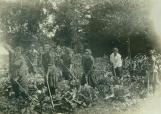1
FARMERETTESThey are through with suffragetting,
They have laid aside their knitting;
They are gaily farmeretting
Where the butterflies are flitting
And the wiggly, woolly caterpillar feeds.
When the little meadow - sparrows
Chirp their morning obligatos,
In their vegetable marrows
And the turnips and tomatoes
They are waging deadly warfare on the weeds.
And they'll fill the land with brightness,
And the bull will cease to bellow;
And they'll teach the pig politeness,
And with ditties soft and mellow
They will put the young asparagus to bed.
This poem was reprinted in the "Grimsby Independent" on Wednesday, September 11, 1918 and was originally submitted to "New York Life" by poet Arthur Guiterman.
2
FARMERETTES OF WORLD WAR ONEDuring the First World War, women of university age volunteered to help in the fields. An article printed in the "Grimsby Independent" in 1917 stated "when the history of this Great War is written, a page should be reserved for these heroic young ladies who are nobly doing their bit." The Young Women's Christian Association (YWCA) brought women enrolled in universities and ladies' colleges to the Niagara Peninsula to harvest fruit crops. The local farmers needed the help of these students because the older women who were already out of school were employed at the munitions factories as part of the war effort. These young ladies, considered to be heroes by many because they harvested the food that fed the soldiers, were known as Farm Service Girls or Farmerettes.
3
When Nature Smiles - Grimsby Farmerettes20th Century, Circa 1918
Grimsby, Ontario, Canada
 Credits:
Credits:Produced By the Canadian Government Motion Picture Bureau, Circa 1918. Copyright: National Film Board of Canada
6
Farmerettes Working in a Field1917-1918
Grimsby, Ontario, Canada
 Credits:
Credits:Grimsby Museum Collection
7
Farmerettes Picking Fruit From a Tree1917-1918
Grimsby, Ontario, Canada
 Credits:
Credits:Grimsby Museum Collection
8
In the beginning, the idea of having these girls work on the farm was not well received because the majority of the women had no farming experience. They came from across the country, especially Montreal, Quebec City and Ontario communities. In the first year seventy women arrived, and were housed near Beamsville, Winona and at the Cook House and R.O. Smith farm in Grimsby. The ladies were supervised at each residence by a YWCA chaperone. Some of the Farmerettes during World War One were housed in camps, sleeping in canvas tents. The girls also slept on cots under the stars on clear nights. Many of their facilities, including their washing facilities, were outdoors.For many of the girls it was a rough time, coming from an upper middle class family, but many others saw their summer as an adventure and enjoyed every minute. They were paid $1 to $4 per day and were expected to pay board. Their official uniform consisted of dark bloomers and khaki coloured middies.
10
The farmers were slow to give the women work but after a time it became necessary for the farms to remain productive. With the help of the Farmerettes, the fruit was harvested with minimal loss, thus saving famers thousands of dollars. Many of the farmers were impressed by the work that was done by these young ladies. The "Grimsby Independent" of 1917 quoted one farmer as saying "Some of them (farmers) would sooner sell their farms than to try and run them without the help of the co-eds."11
Farmerette Working in a Field1917-1918
R. O. Smith Farm, Grimsby, Ontario, Canada
 Credits:
Credits:Grimsby Museum Collection
12
Farmerettes on a Dray (Wagon)1917-1918
R. O. Smith Farm, Grimsby, Ontario, Canada
 Credits:
Credits:Grimsby Museum Collection
13
Farmerettes Outside the Barn at the R.O. Smith Farm1917-1918
R. O. Smith Farm, Grimsby, Ontario, Canada
 Credits:
Credits:Grimsby Museum Collection


